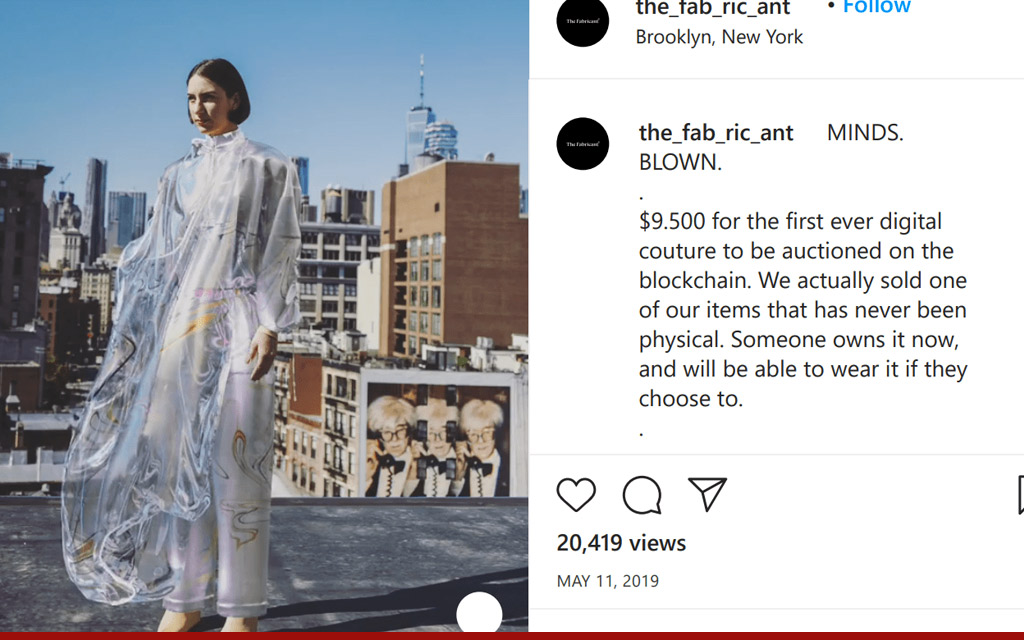We’re almost eight months into the pandemic lifestyle. That’s nearly long enough to complete a pregnancy and it’s certainly been long enough to make the screen our central “door” to the world.
As we stare at our screens for a larger portion of each day, the lines between real and digital are getting fuzzier. This week I caught myself asking my hairstylist to give me a cut that looks good on a “Zoom”. When I went seeking my Zoom “beauty filter” setting, I sadly discovered that it was already on by default.
Now we’ve learned to dress for the screen. Outlets from USA Today to Vogue are doling out how-tos for looking good in the virtual world.
Fever Dreams
Phase 2 of screen life will blur real and digital even more. This year’s Fashion Week, which morphed into a month of virtual previews, became a fever dream of melded realities. Human models, avatars, physical fabrics and digital creations all co-mingled on fantasy-inspired runways.
And now that fashion and beauty’s most loyal customers are spending more time online than off, designers and beauty brands are following. Now avatars, beauty filters and digital clothing are becoming extensions of the self.
Tutorials on how to apply digital makeup abound on SnapChat. Why bother primping with real products when you can slap on a digital equivalent? Beauty filters popularized by Instagram are now being scrutinized (and sometimes actually removed by the service) in a debate about whether such AR filters mess with the mental health of young, mostly female users. Beyond doing your own digital makeup, we’re also seeing makeup for our avatars gaining traction. Sim4 and M.A.C. cosmetics have teamed up to beautify your digital game.
MobileMarketer reports that Snapchat saw a surge in usage during the pandemic, with a 37% lift in shared photos that use its camera augmented reality (AR). The numbers reflect how many users are passing each day trying on rabbit ears, false eyelashes, and who knows what else.
Digital Couture
Dressing up for a party doesn’t need to involve anything but bits and bytes of clothing, either. Gucci’s been dabbling in selling virtual clothing, shoes and accessories that exist only in the digital world. Ralph Lauren uses Snap to outfit avatars on Bitmoji. So does the Air Jordan brand.
The Fabricant is a design house that specializes in fashion solely for the virtual world. Its website refers to its customer base as Digi-Sapiens, made up of the roughly 3.5 billion individuals on the internet globally. According to Fabricant’s CEO, such Gen-Zs and young millennials have grown up blurring the line between reality and fantasy. Recently a Fabricant creation sold for $9,500. It exists only for online dressup. (See illustration at top of this article.)
The fashion industry’s Circular Summit was held in VR, headsets included. Margot, Shudu and Zhi, three ethnically-blended avatar runway models were the stars of the show. Shudu has over 200,000 followers on Instagram. Improbable as it seems, even Animal Crossing, the hangout for cute critters and their human caretakers, plays dress up as well. Valentino, Marc Jacobs, and Anna Sui are just a few of traditional fashion brands that hang their clothes on this popular Nintendo game.
Big Business or Flash in the Marketing Pan
From eSports to games like Second Life, there has always been a devout group willing to spend real money for fake (aka digital) goods. It’s only natural that big brands would want to jump into the realm and capitalize on the booming digital-only economy.
Leonard Lauder (the eminence grise of Estee Lauder) talked after 9/11 about the lipstick effect, noticing that in stressful times, lipstick sales went up. He attributed it to our need for low cost, immediately gratifying pleasures during uncertain times. Digital goods (at least ones that cost less than $9,500) may be the equivalent of digital lipstick. When the pandemic finally subsides we’ll see whether a larger percentage of our world goes back to being real. I wouldn’t bet on it.
READ MORE: https://techonomy.com/2020/10/pandemic-fashion-and-beauty-does-reality-still-matter/




